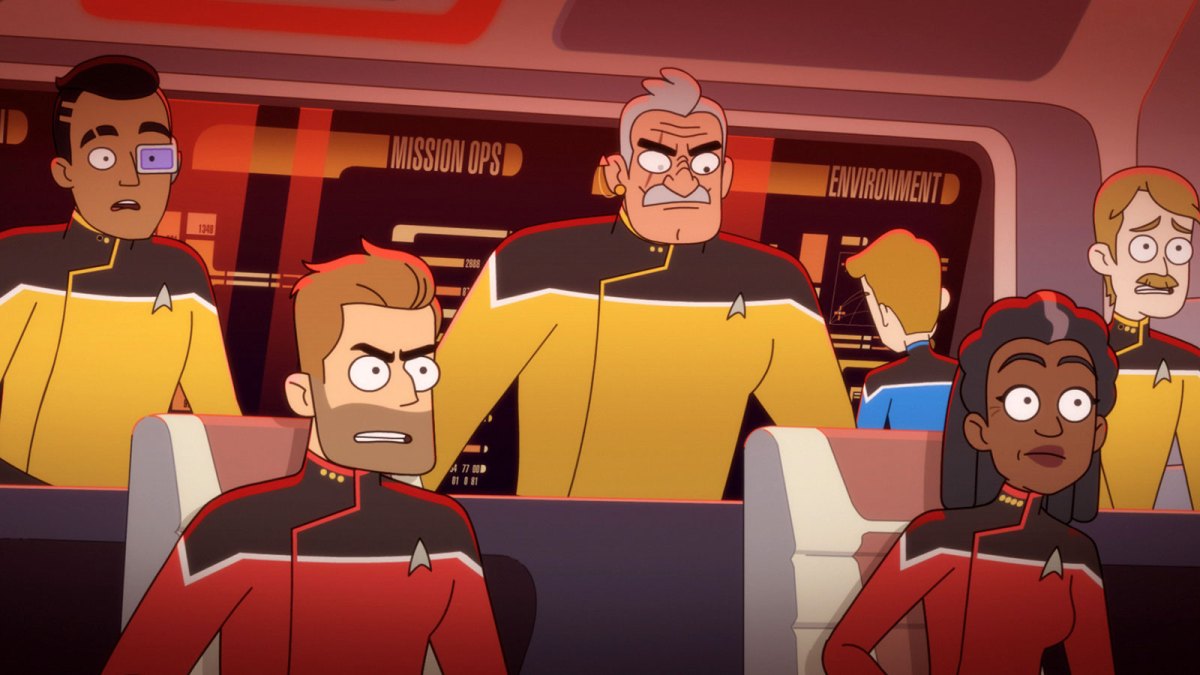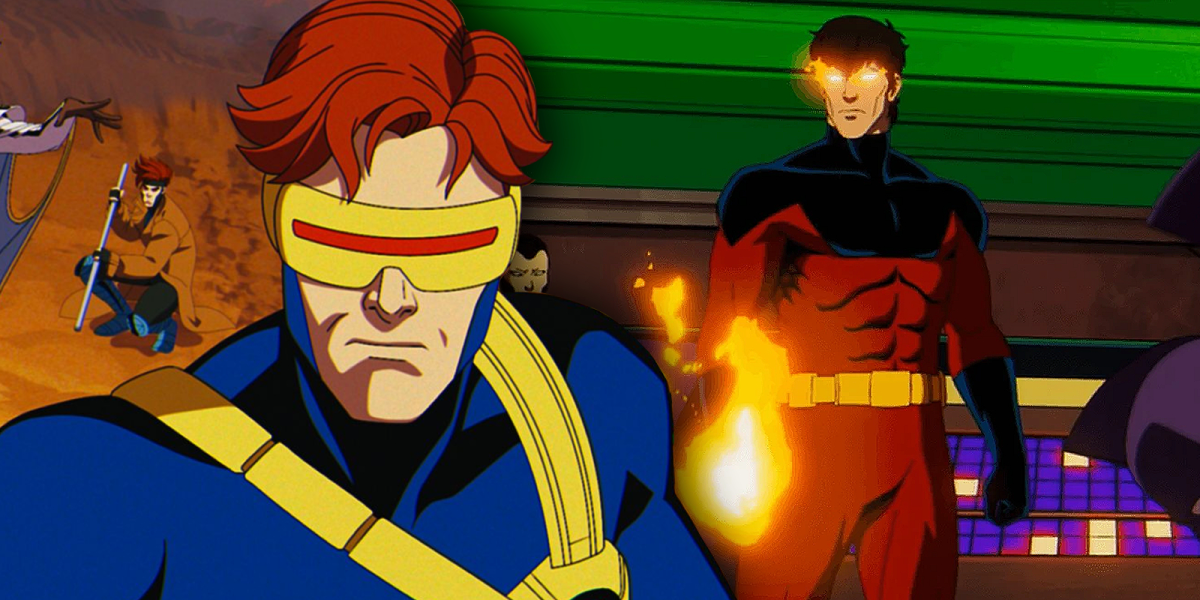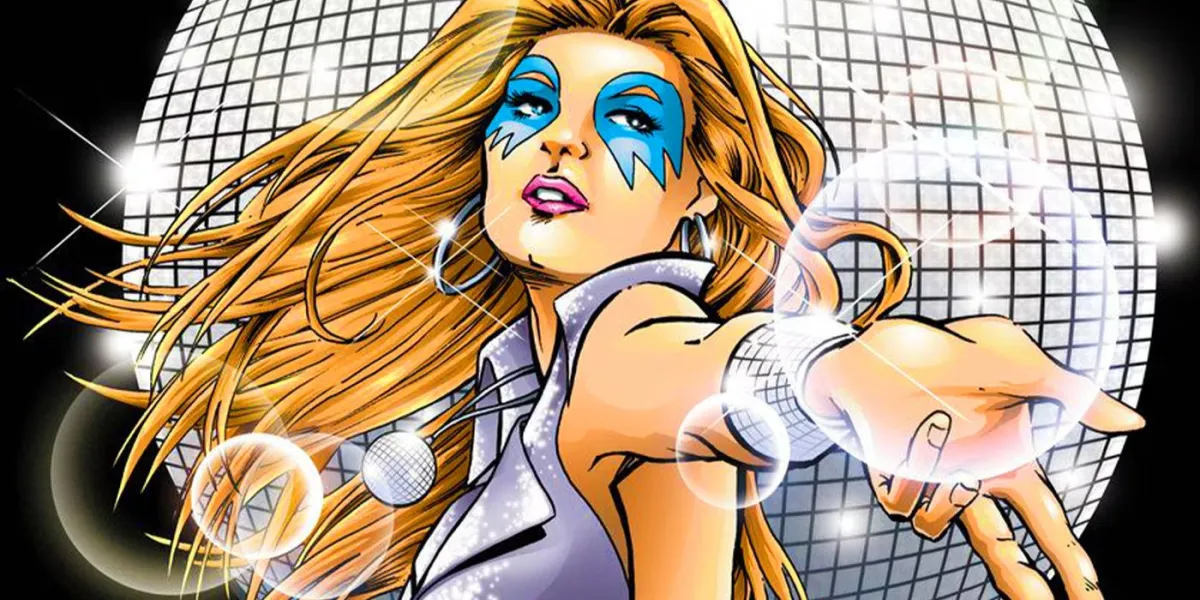Warning: This review and recap of Star Trek: Lower Decks Season 4, Episode 7, “A Few Badgeys More,” contains spoilers.
“A Few Badgeys More” is comfortably the weakest episode of the fourth season of Star Trek: Lower Decks to this point. It is a shame, because it has a lot going for it.
“A Few Badgeys More” occupies the same slot that “A Mathematically Perfect Redemption” occupied in the third season and that “Where Pleasant Fountains Lie” held in the second season. Indeed, that’s only one space off the slot that “Terminal Provocations” held in the first season. So it makes sense that “A Few Badgeys More” would combine the artificial-intelligence guest stars of those episodes: Badgey (Jack McBrayer), Peanut Hamper (Kether Donohue), and AGIMUS (Jeffrey Combs).
Those were among the most memorable and successful episodes of their individual seasons. Indeed, there is a solid argument to be made for “A Mathematically Perfect Redemption” as the single best Star Trek episode of the past five years, allowing for “Under the Cloak of War.” There is maybe something a little fan-fiction-y and self-indulgent about bringing those three characters together for a crossover episode, but it fits with the show’s recurring emphasis on artificial intelligence.
Related: Star Trek: Lower Decks Season 4 Has a T’Lyn Problem
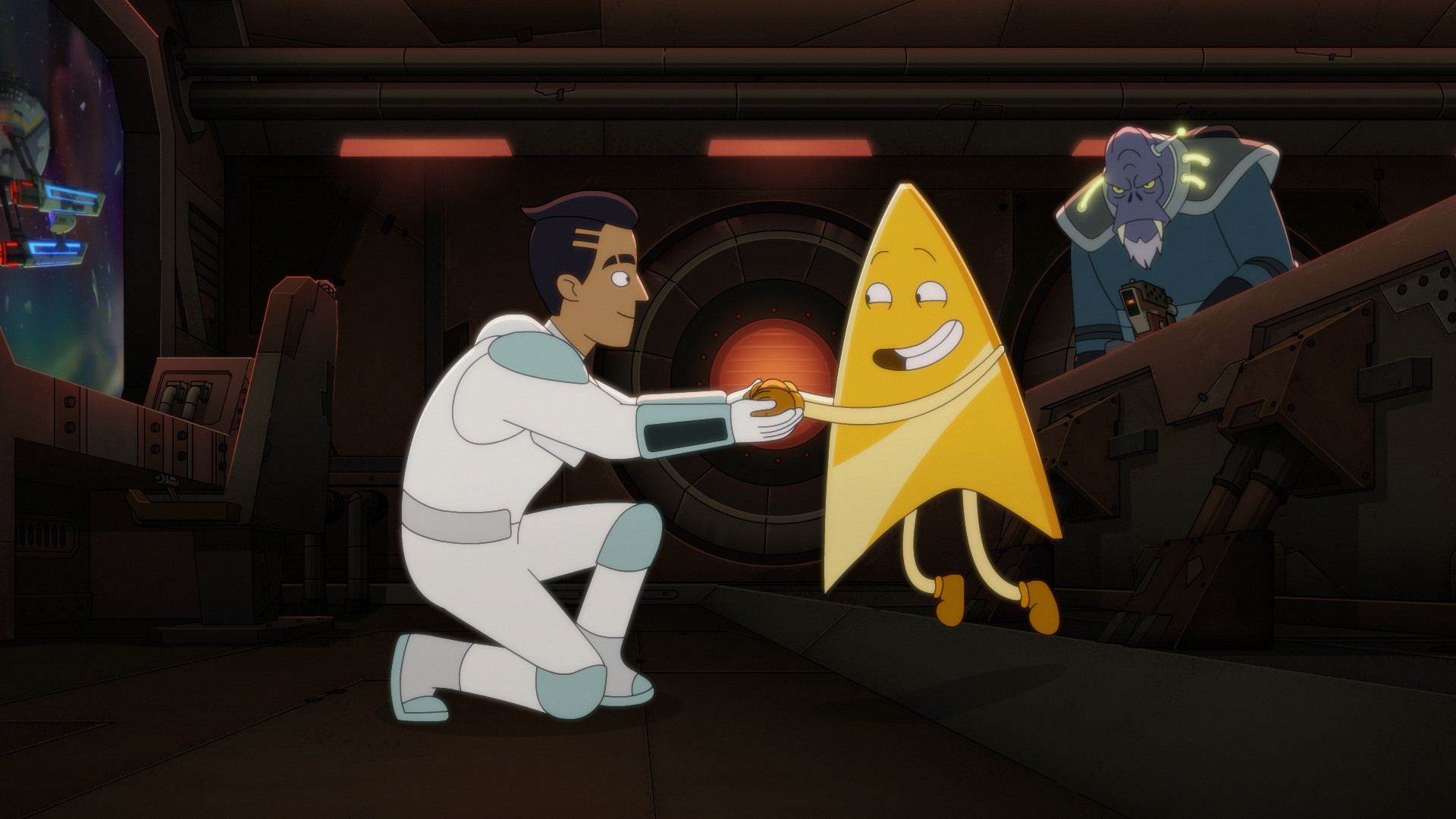
More than that, the three characters are individually interesting and the three guest performers are among the most distinctive and charming to appear on Lower Decks. McBrayer is fun as a psychotic riff on “Clippy,” Donohue’s “Valley-girl sociopath” is an inspired concept, and Combs remains one of the best actors ever to work on the Star Trek franchise. Setting aside the fan service of throwing these three characters into a story together, it’s just good to check on them again.
However, “A Few Badgeys More” just doesn’t work. It’s the kind of story that feels lazy in every way that it is possible for a Lower Decks story to feel lazy. In narrative terms, it is a collection of the show’s worst impulses thrown into a blender and served to audiences. It’s particularly frustrating because it feels like the episode’s script is coasting on the high concept of throwing these three characters together into a script and assuming that will be enough to produce a good episode.
“A Few Badgeys More” does not work in any way that it is possible for a Lower Decks episode to work. Most superficially, it doesn’t really work as a Star Trek story. One of the most consistently impressive things about Lower Decks is the way that the show consistently manages to tell functional Star Trek stories within the framework of a sitcom. The primary plots of episodes like “I Have No Bones Yet I Must Flee” or “In the Cradle of Vexilon” could easily be reworked as Star Trek: Voyager episodes.
“A Few Badgeys More” relies on the characters behaving like idiots in order to move the plot forward. Of course, sitcoms and dramas inevitably depend on protagonists making bad choices in order to advance the story. However, there is no internal logic threshold for “A Few Badgeys More.” There is no reason for the parole board to believe that Peanut Hamper has reformed. Given her relationship with AGIMUS, his volunteering of information about the Bynar ship should be met with suspicion.
Of course, the script handwaves these details through exposition. “Gosh, she hasn’t been in there very long,” Tendi (Noël Wells) notes when informed of Peanut Hamper’s hearing. “I guess the system works.” In the briefing, Ransom (Jerry O’Connell) even notes the “extremely suspicious timing” of AGIMUS’ information. However, this is the sort of humor associated with modern blockbusters, drawing attention to the contrivances in the hopes of beating the audience to the joke.
Similarly, once AGIMUS enacts his plan, the episode hinges on Boimler (Jack Quaid) and Tendi just going along with him. Tendi points out that she could easily free them from his shackles, but Boimler decides to play along to get information. This apparently goes so far as to include letting AGIMUS subjugate an entire planet. Again, the script handwaves it. “Yep, Starfleet definitely wouldn’t be able to reverse this in an hour,” Boimler sarcastically remarks. It doesn’t really make any sense.
There are similar narrative gaps in the subplot focusing on Badgey. It’s strange that Mariner (Tawny Newsome) is able to get away from her station and catch up with Rutherford (Eugene Cordero) before he makes his way over to the Drookmani freighter. It’s also strange that “A Few Badgeys More” completely forgets about the Cerritos once Rutherford makes contact with Badgey. It really seems like the ship is just sitting there doing nothing, its senior staff twiddling their thumbs.
Related: Right Now, the Best Star Trek is Animated Star Trek
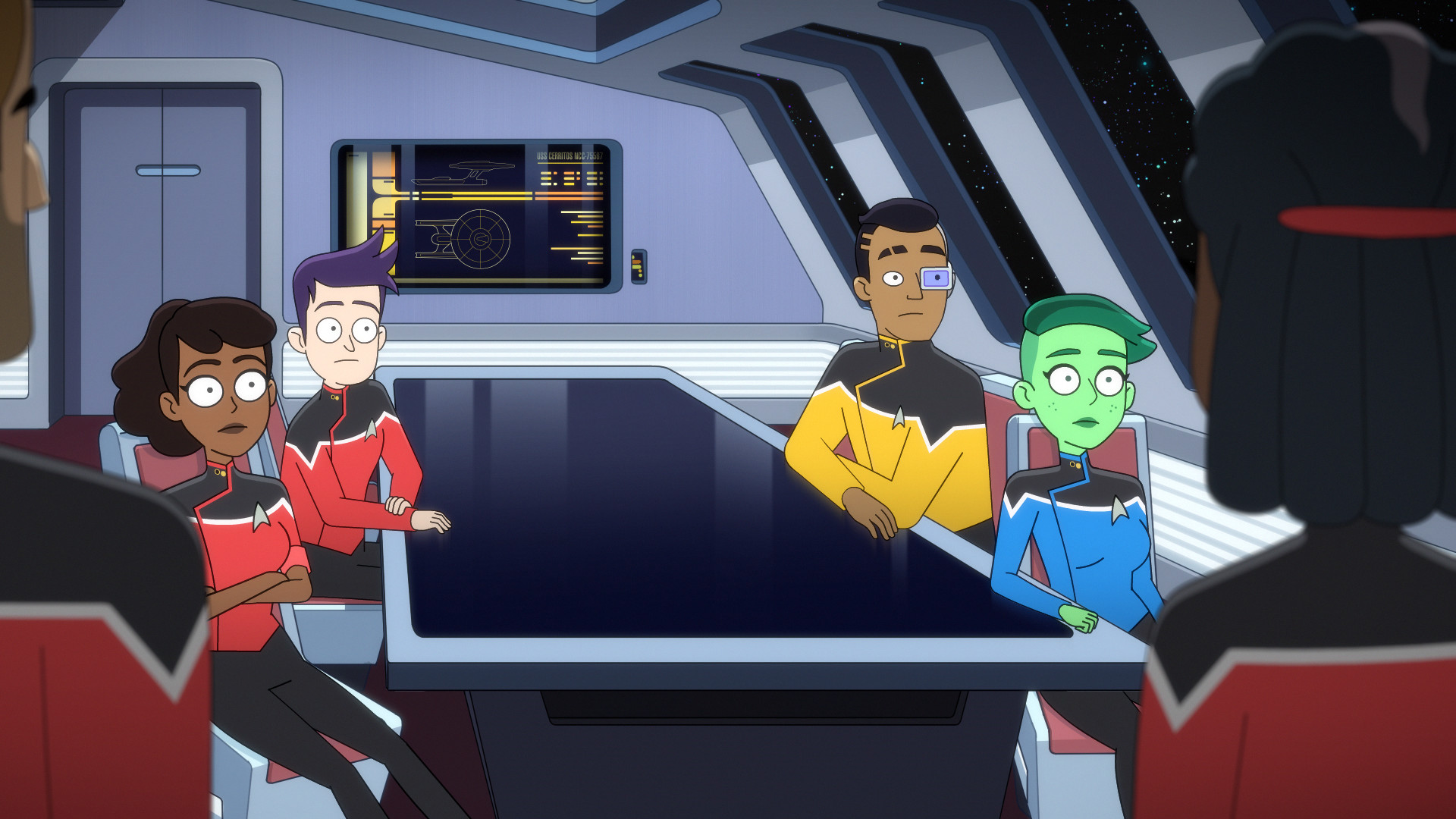
It doesn’t help matters that “A Few Badgeys More” doesn’t really have any idea what to do with Badgey. The character proceeds to malfunction and multiply, spawning off an alternate good self named “Goodgey” and a neutral self named “Logickey.” This is not especially interesting or compelling to watch, and it doesn’t give McBrayer anything interesting to play. As a result, it just feels like the episode is stalling to reach its runtime.
These problems would be excusable if “A Few Badgeys More” was consistently funny. Lapses in logic can be excused in a functional sitcom script. “Twovix” wasn’t the most airtight narrative ever constructed – with Mariner even acknowledging “the Clown wasn’t even a holodeck [program]” – but it was goofy enough and dynamic enough that it worked. Unfortunately, the laughs in “A Few Badgeys More” are few and far between.
Worse than that, every time that “A Few Badgeys More” finds a charming or amusing gag, it proceeds to run that joke into the ground. This is most obvious with the joke about how AGIMUS earns the trust of Boimler and Tendi, simply by switching his control light from a sinister red to a soothing blue. It’s a great joke about the visual shorthand of these sorts of stories. However, “A Few Badgeys More” seems to recognize that this is the best joke in the episode and so keeps making it.
“Oh my god, it’s so convincing,” Peanut Hamper gasps. “You look totally not evil.” Later, as he begins to question AGIMUS’ motivations, Boimler muses, “The light is reassuring.” Later, in the shuttle with Tendi and Boimler, AGIMUS tries to placate them, “You’re thinking of the old red-light AGIMUS. Blue-light AGIMUS wants to help.” It’s a funny joke the first time that the episode makes it, but it quickly wears out its welcome. The same is perhaps true of splitting Badgey into Goodgey and Logickey.
There is also something lazy in the revelation that Peanut Hamper has honestly reformed, completely off-screen. “I loved scheming with you,” she confesses to AGIMUS. “But when we were writing my fake speech for the parole board, I realized it wasn’t fake. I really did feel remorse for betraying everyone.” This is a betrayal of what made Peanut Hamper so interesting. Part of what made her so compelling as the hero of “A Mathematically Perfect Redemption” was her unrepentant awfulness.
That episode was about Peanut Hamper stage managing her moral redemption, so it doesn’t make any sense that she would have an honest-to-goodness change of heart off-screen. If Peanut Hamper could be converted to altruism through pretending to be altruistic, why wasn’t she redeemed on Areolus? The choice feels like a cynical effort to placate fans who objected to Peanut Hamper as “a self-centered twit” who was “thoroughly unlikeable.”
It also doesn’t make any sense. If Peanut Hamper has been redeemed, if she is no longer completely self-centered, then why wouldn’t she do something about AGIMUS’ prison break? She could meet up with him as promised and explain herself or she could warn Starfleet that a megalomaniacal computer was planning to escape. Either choice could make sense. Her refusal to do either suggests that she is just as self-centered as she ever was, even as the episode insists the opposite.
There are some half-formed good ideas here. In particular, allowing for the issue of Peanut Hamper’s unearned off-screen redemption arc, it is nice to see Lower Decks extend the franchise’s trademark humanism to its artificial intelligences. “A Few Badgeys More” seems to suggest that AGIMUS could be redeemed through love. It’s corny and cheesy, but many of the best Star Trek episodes are unashamedly corny and cheesy.
Related: Star Trek: Lower Decks’ Latest Episode Does an Unconvincing Deep Space Nine Impression
“I didn’t want to subjugate a planet again,” AGIMUS confesses to Peanut Hamper. “I already did that. It was just an excuse to spend more time with you.” There’s obviously an element of absurdist comedy baked into the image of two insane computers having this conversation, but beneath that absurdity is a charming sincerity. Even a monstrous evil computer like AGIMUS can make the conscious choice to better himself. There is something inherently optimistic in that idea.
That carries over to Badgey, who seems to achieve “singularity.” As his code spreads and his cosmic awareness widens, he boasts, “I can detonate every warp core. I can kill anyone I want. But… why?” That question haunts him. “I have unlimited power and infinite knowledge,” he admits. “I can see the creation of time and its end.” He has transcended hatred and violence. In Mariner’s words, he has “accidentally [turned] into an omniscient god.”
Again, this is trademark Star Trek utopianism. “A Few Badgeys More” suggests that it is impossible for an entity to be truly all-seeing and all-powerful without becoming enlightened. More knowledge and more power makes a person better. Of course, “Where No Man Has Gone Before” and “Hide & Q” push against this idea, but there’s something inherently hopeful about the idea that evolving means leaving one’s worst impulses behind. Rutherford cheers Badgey on, “Good luck being everything.”
“A Few Badgeys More” is impressive on a technical level. The animation is top notch, particularly of Badgey. The shading and the eyes are striking, and there are some wonderful visuals as Badgey reaches enlightenment. Chris Westlake’s score is similarly impressive. As with the trip to Orion in “Something Borrowed, Something Green,” one can sense his experience working with John Williams on Star Wars: The Force Awakens rubbing off on him.
Sadly, though, “A Few Badgeys More” is a dud. It is the biggest misfire of the season to this point, and a wasted opportunity given all the potential that it had.

